|
| |
Hercules
Review by Carrie
Gorringe
Posted 27 June 1997
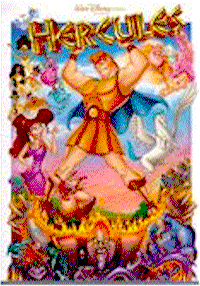 |
|
Directed by John Musker and Ron
Clements
Starring the voices of Tate Donovan
(Adult Hercules),
Danny DeVito (Phil) , James Woods (Hades),
Susan Egan (Meg), Rip Torn (Zeus) ,
Samantha Eggar (Hera), Bobcat Goldthwait (Pain),
Matt Frewer (Panic), Hal Holbrook (Amphitryon),
Barbara Barrie (Alcmene),
Amanda Plummer (the Fates/Thebans),
Paul Shaffer (Hermes), Lillias White, LaChanze,
Vaneese Thomas, Cheryl Freeman,
Roz Ryan (the Muses), and Charlton Heston (narrator).
Animation Screenplay by Ron Clements,
John Musker,
Donald McEnery, Bob Shaw and Irene Mecchi |
Before a discussion of the new
Disney animated film, Hercules, disintegrates into one of those fights over how
accurately the directors and screenwriters have accurately depicted the mythological
events described herein, and how Western culture is taking yet another turn on
Spengler’s helix of doom with all the speed of a Formula One racer (shades of last
year’s debate over Disney’s interpretation of the Hugo classic, Notre Dame de Paris), let’s make one thing perfectly
clear as soon as possible: with all respect to the purity of classical literature and myth
aside, the idea of discussing literary accuracy in a Disney animated film is irrelevant.
These films are, at their very best, gentle parodies of both their source material and
their contemporary society. Moreover, there are only four qualitative categories by which
to judge these films: the animation, the strength of the hero’s sidekicks as they act
as a counterbalance to his overwhelmingly decent behavior (it’s not as bad here as it
could have been), the evil of the villain and his sidekicks, and the amount of whining you
can endure from your children (should you have any) before you admit defeat and pack them
into the car for a matinee screening. If, however, you can muster up a great suspension of
disbelief and merely want to be entertained, Hercules will do the job effectively
and without apology.
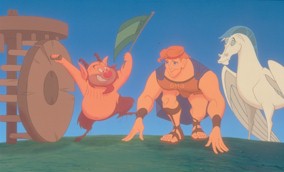 This, according
to the screenwriters, is the story of Hercules: our hero is the offspring of Hera and
Zeus, who is kidnapped by two minions named Pain and Panic under the direction of their
master, Hades, Lord of the Underworld. Hades, it seems, has plans for an other-worldly
coup d’etat, plans that would be thwarted eighteen years hence, should the baby
Hercules grow to manhood. Ordered to make the child mortal and then kill him, Pain and
Panic botch the job quite badly. The baby is found and raised by Amphitryon and Alcmene, a
childless couple overjoyed by their find, and not willing to ask too many questions
concerning the baby’s background. However, by the time he reaches adolescence,
Hercules’s strength is causing conflict with the villagers (something to do with
wrecking the marketplace single-handedly). On a trip to Zeus’s temple to pray for
salvation, the young man is informed about his former status in life, and the youth
decides to seek out one Philoctetes, "Phil" for short, a satyr with a gift for
training sports champions. Reluctantly he takes on this "one last hero", and,
after training, takes Hercules and Pegasus, Herc’s trusty winged steed, to Thebes
("The Big Olive," Phil calls it), where Hercules undergoes many challenges in an
attempt to become a hero and regain his godly status. On the way to glory, however, Herc
must overcome two challenges: the threat from Hades, who isn’t the least bit happy
over Herc’s survival, and the threat to his heart from Megara, nicknamed
"Meg", a feisty maiden who doesn’t see Herc as God’s gift to women.
All of this activity, except for the introductory narration delivered by Moses himself, is
commented upon by the five muses, who act and sing with the same saucy verve of the Five
Supremes, if there had ever been such a group. Our five lovely muses give us a swinging
update on each twist and turn in Herc’s adventures, assuring us that everything they
sing is "the gospel truth". Naturally, it isn’t but, perhaps it’s just
as well, with the National Baptists demanding a boycott of Disney products and films, that
the screenwriters neglected to mention that the "real" Hercules was the
by-product of one of Zeus’ extra-marital trysts. This, according
to the screenwriters, is the story of Hercules: our hero is the offspring of Hera and
Zeus, who is kidnapped by two minions named Pain and Panic under the direction of their
master, Hades, Lord of the Underworld. Hades, it seems, has plans for an other-worldly
coup d’etat, plans that would be thwarted eighteen years hence, should the baby
Hercules grow to manhood. Ordered to make the child mortal and then kill him, Pain and
Panic botch the job quite badly. The baby is found and raised by Amphitryon and Alcmene, a
childless couple overjoyed by their find, and not willing to ask too many questions
concerning the baby’s background. However, by the time he reaches adolescence,
Hercules’s strength is causing conflict with the villagers (something to do with
wrecking the marketplace single-handedly). On a trip to Zeus’s temple to pray for
salvation, the young man is informed about his former status in life, and the youth
decides to seek out one Philoctetes, "Phil" for short, a satyr with a gift for
training sports champions. Reluctantly he takes on this "one last hero", and,
after training, takes Hercules and Pegasus, Herc’s trusty winged steed, to Thebes
("The Big Olive," Phil calls it), where Hercules undergoes many challenges in an
attempt to become a hero and regain his godly status. On the way to glory, however, Herc
must overcome two challenges: the threat from Hades, who isn’t the least bit happy
over Herc’s survival, and the threat to his heart from Megara, nicknamed
"Meg", a feisty maiden who doesn’t see Herc as God’s gift to women.
All of this activity, except for the introductory narration delivered by Moses himself, is
commented upon by the five muses, who act and sing with the same saucy verve of the Five
Supremes, if there had ever been such a group. Our five lovely muses give us a swinging
update on each twist and turn in Herc’s adventures, assuring us that everything they
sing is "the gospel truth". Naturally, it isn’t but, perhaps it’s just
as well, with the National Baptists demanding a boycott of Disney products and films, that
the screenwriters neglected to mention that the "real" Hercules was the
by-product of one of Zeus’ extra-marital trysts.
There is one indisputable truth at work here: the animation in Hercules is of
the highest quality in ten years. The key to the visual awe that the film inspires has a
lot to do with one word: integration. With this film, the animation unit has succeeded in
welding together two disparate types of animation – the three-dimensional and the
so-called "flat" animation into a seamless whole. 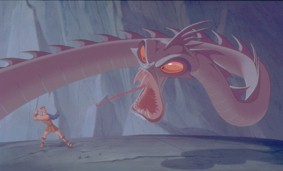 In earlier Disney films,
such as Beauty and the Beast and The Lion King, the differences between the
two types were glaringly obvious as shots containing one style were juxtaposed with shots
of the other; under these circumstances, spatial dimensions often seemed askew to the
point of disorientation. No detracting elements exist this time. The success is apparent
in Hercules’s fight sequences, especially in Herc’s fight with the
many-headed Hydra; it had a mentally scarifying effect that I haven’t felt since
watching the "Night on Bald Mountain" sequence from Fantasia (animated by
the legendary Vladimir Tytla) on a large screen. This sequence adds new meaning to the
term, "close-up; as the camera tracks into an empty space and a malevolent,
fang-bearing mouth suddenly soars straight for the camera from the hero’s point of
view, you had better have a firm grip on your bag of popcorn -- likewise for the final
showdown between Herc and the Titans. The achievement, coming as it does nearly ten years
after the first experiments in combining the two processes in Oliver
and Company, is even more beautiful for all the waiting (though perhaps a little
too scary for children under the age of five). In earlier Disney films,
such as Beauty and the Beast and The Lion King, the differences between the
two types were glaringly obvious as shots containing one style were juxtaposed with shots
of the other; under these circumstances, spatial dimensions often seemed askew to the
point of disorientation. No detracting elements exist this time. The success is apparent
in Hercules’s fight sequences, especially in Herc’s fight with the
many-headed Hydra; it had a mentally scarifying effect that I haven’t felt since
watching the "Night on Bald Mountain" sequence from Fantasia (animated by
the legendary Vladimir Tytla) on a large screen. This sequence adds new meaning to the
term, "close-up; as the camera tracks into an empty space and a malevolent,
fang-bearing mouth suddenly soars straight for the camera from the hero’s point of
view, you had better have a firm grip on your bag of popcorn -- likewise for the final
showdown between Herc and the Titans. The achievement, coming as it does nearly ten years
after the first experiments in combining the two processes in Oliver
and Company, is even more beautiful for all the waiting (though perhaps a little
too scary for children under the age of five).
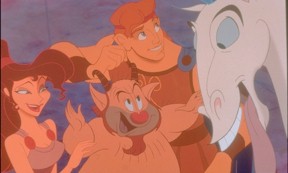 Then we have Phil
and Meg, Herc’s mentor and love interest, respectively. Short of stature but not of
chutzpah, Phil is all boisterousness and punning ripostes, as one might expect from a
character whose voice and personality are borrowed straight from Danny DeVito – the
combination is irresistible. Meg seems to be yet another one of those Disney heroines who
conforms to a new stereotype: that of the feisty female. She is saved from potential
mediocrity by the insolent manner in which she delivers her lines (usually accompanied by
a strong shift from her hips) and her obvious mocking sensuality – call her classical
Greece’s answer to Mae West. These two, entrusted with keeping our hero on the
straight and narrow path to deification, have a real fight on their hands (well, Phil has
a real fight on his hoofs, but metaphors are only barely efficient where a blurring of
categories is concerned). Then we have Phil
and Meg, Herc’s mentor and love interest, respectively. Short of stature but not of
chutzpah, Phil is all boisterousness and punning ripostes, as one might expect from a
character whose voice and personality are borrowed straight from Danny DeVito – the
combination is irresistible. Meg seems to be yet another one of those Disney heroines who
conforms to a new stereotype: that of the feisty female. She is saved from potential
mediocrity by the insolent manner in which she delivers her lines (usually accompanied by
a strong shift from her hips) and her obvious mocking sensuality – call her classical
Greece’s answer to Mae West. These two, entrusted with keeping our hero on the
straight and narrow path to deification, have a real fight on their hands (well, Phil has
a real fight on his hoofs, but metaphors are only barely efficient where a blurring of
categories is concerned).
But, of course, a Disney animated feature film is nothing without a villain of
unrelentingly nasty wit and shrewdness, and Hades is, if you’ll pardon the
expression, the answer to everyone’s prayers. Resembling nothing so much as a cross
between Gorgeous George and Christopher Walken on a bad hair day, His Royal Viciousness
conceals his burning desire (you knew I had to say it) for power underneath all the smarmy
spiel of your Uncle Lester, the used-car salesman -- or perhaps Lester’s upscale
counterpart, the Hollywood agent. 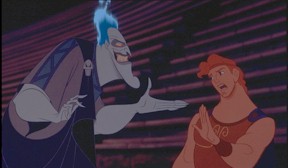 All this god needs is a loud plaid suit and a polka-dot tie (or,
correspondingly, Armani to the max) and he could be fleecing anyone, anywhere, anytime,
with his phony, 10000-watt, "trust-me" smile at the ready, as he runs the
underworld like a demented C.E.O. "Memo to me," he purrs with cruel glee to his
extremely-flawed flunkies, Pain and Panic, after they fail him yet again, "Maim you
[two] – after my meeting." Woods delivers Hades’s verbal goods with wicked
relish. I was going to remark on the incredible nature of Wood’s performance here;
the problem with such an adjective is the absolute credibility of what Woods puts across,
since he truly gives the character a legitimate other-worldly persona – the flip side
of Zeus’ bombastic merriment, as delivered flawlessly by Rip Torn. The difference
between Hades and the miserable antics of last year’s villain are considerable: Dom
Frollo of The Hunchback of Notre Dame failed to be effective – he was too
melodramatic to remain outside the fate that he imposed upon others from the very
beginning. Hades, on the other hand, is up to his neck solely in machinations; he gives
the impression that he just might elude the consequences of his actions, and that kind of
untrammeled power makes him fascinating to watch. Woods is ably assisted in his
malevolently merry game by the manic antics of Frewer (best known for the television show,
Max Headroom) and Golthwait (best known as a comedian whose high-volume, frenetic
behavior makes him a poster child for Prozac). But even as Hades sneers at his rival,
Zeus, for giving Achilles that bum heel of his, his own two little Achilles heels wait
abjectly for their master’s call, ready to demonstrate at a moment’s notice
– and to Hades’ detriment -- exactly how many good intentions are needed in
paving the road to hell. All this god needs is a loud plaid suit and a polka-dot tie (or,
correspondingly, Armani to the max) and he could be fleecing anyone, anywhere, anytime,
with his phony, 10000-watt, "trust-me" smile at the ready, as he runs the
underworld like a demented C.E.O. "Memo to me," he purrs with cruel glee to his
extremely-flawed flunkies, Pain and Panic, after they fail him yet again, "Maim you
[two] – after my meeting." Woods delivers Hades’s verbal goods with wicked
relish. I was going to remark on the incredible nature of Wood’s performance here;
the problem with such an adjective is the absolute credibility of what Woods puts across,
since he truly gives the character a legitimate other-worldly persona – the flip side
of Zeus’ bombastic merriment, as delivered flawlessly by Rip Torn. The difference
between Hades and the miserable antics of last year’s villain are considerable: Dom
Frollo of The Hunchback of Notre Dame failed to be effective – he was too
melodramatic to remain outside the fate that he imposed upon others from the very
beginning. Hades, on the other hand, is up to his neck solely in machinations; he gives
the impression that he just might elude the consequences of his actions, and that kind of
untrammeled power makes him fascinating to watch. Woods is ably assisted in his
malevolently merry game by the manic antics of Frewer (best known for the television show,
Max Headroom) and Golthwait (best known as a comedian whose high-volume, frenetic
behavior makes him a poster child for Prozac). But even as Hades sneers at his rival,
Zeus, for giving Achilles that bum heel of his, his own two little Achilles heels wait
abjectly for their master’s call, ready to demonstrate at a moment’s notice
– and to Hades’ detriment -- exactly how many good intentions are needed in
paving the road to hell.
In the case of Hercules, however, good intentions make for great entertainment.
There’s enough madness of every type for everyone, so, fulfilling all of the promises
for animation quality, sidekicks and villains, Hercules is great fun -- and
that’s the gospel truth (the fourth element is a little more difficult to predict;
the length of time that you can hold out against your children’s entreaties is your
own business).
Contents | Features
| Reviews | News | Archives | Store
Copyright © 1999 by Nitrate Productions, Inc. All Rights
Reserved.
| |
|